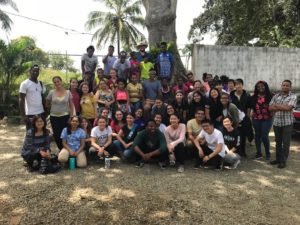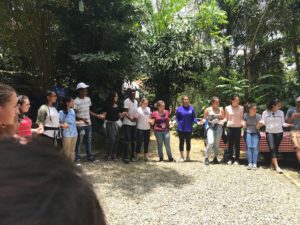Today the Glimpsers went to Batey Palave, a community made up of Haitians, Dominicans and Haitians who were born in the Dominican Republic for Immigration Day. The Glimpsers had the opportunity to learn about the Haitian immigrants’ history. They learned that in the 1920s the Dominican Republic gave Haitians a contract to stay in the Dominican Republic to work in sugar cane plantations for six months. What happened is that some of these Haitians built a life here so they decided to stay and not return after their contract expired. They had families here and more generations were reproduced. Around 2010, the DR denied citizenship to all the contract holders and their family members leaving thousands of Haitians that resided in the DR to be left with no citizenship (they are illegal). Haitian law states that no matter where you’re born, if you come from Haitian decent, you’re Haitian. However, because of natural disasters that happened in Haiti, a lot of the documents were destroyed. This led to Haitians not being able to be accepted or recognized in either country.
Communities like Batey Palave were created to give Haitians a place to call home. Upon arrival at the community we had a presentation from Ernesto Lluberes on the context of Batey Palave and their members’ immigration struggles. After that we took a tour of the community. We were able to meet people who had been around to work in the sugar cane plantations. We met an older man who stated that he only got paid 5 pesos per month. We were also able to see the homes of the workers; they were small homes that fit 15 people. They all shared a small bathroom.
Some of the current issues that Haitians who reside in the DR face include a denial of citizenship from the country they reside in. Without a citizenship they cannot attend school after they reach the eighth grade. Another struggle Haitians face is with their identity because they feel like they’re excluded from both countries, feeling like they don’t belong anywhere because no country accepts or recognizes them. This is why the community of Batey Palate is crucial to the Haitians who were born and not accepted in the Dominican Republic. Batey Palave ensures that the members of the community feel safe, like they belong and that they have the encouragement to find their own identity and not allow anyone to define who they are.
This experience made us realize that we should be grateful for being born in a country that recognizes us as people, and that although we are recognized we also share Haitians´ struggles because as immigrants in the US, we sometimes feel like we don’t always fit in, or feel like we belong. This experience made us realize that we should all come together and appreciate our differences.



Such interesting days you all are having. I miss you Olive. Can’t wait for you to come home.
I’m glad you guys were able to reflect on some differences and similarities countries have. And like you said we are all the same and might be experiencing the same struggles. Glad you guys are enjoying the DR while learning at the same time! Enjoy this experience and always carry everything you retain in your journey of life. We miss and love you Sammy!…well all three of you!
Glad everyone are able to experience and see the first hand the way of life there compares to here in the United States.
Now Emmy you understand when daddy said “you don’t know how lucky you have it here in the United States?” Remember daddy and daddy’s family was in Thai refugees camps for 3 years and experiences the life of 3rd world country of living prior to coming to the United States.
Love you and misses you much, YES both of your brothers misses you too believe it or not. Oh yeah your mommy too ❤️.